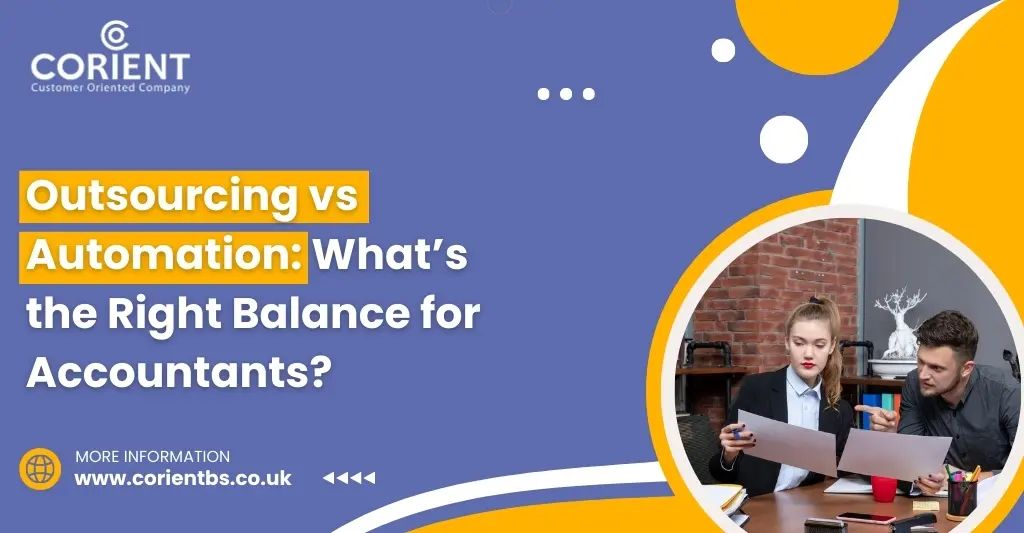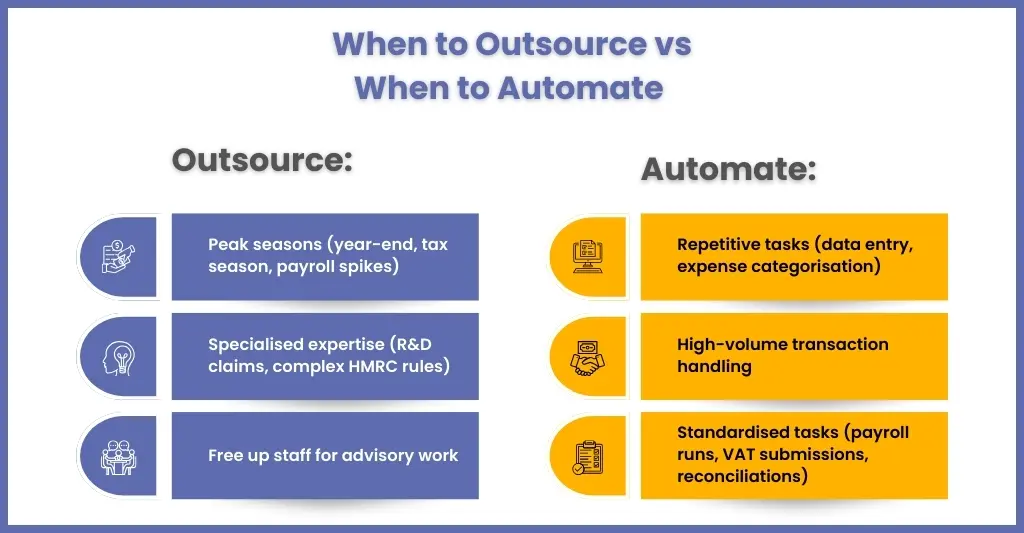
Outsourcing vs Automation: What’s the Right Balance for Accountants?
Outsourcing vs automation is competition that is growing in recent years and accounting practices in the UK are finding it difficult to balance. Most practices in the United Kingdom are under pressure from HMRC deadlines, rising client expectations, and cost pressures. Such situations have made them more aware of outsourcing and automation and its utility in improving efficiency, reducing costs, and optimising operations, especially when the regulatory environment is tough. The aim of both is the same, but their implementation and impact differ.
Outsourcing delegates certain accounting functions to an external service provider, thereby leveraging their expertise and reducing costs. On the other hand, automation uses technology and machines to automate repetitive and manual work. Despite their differences, their goal is the same: streamlining operations, driving innovation, and enabling your clients to focus on their core competencies.
In this blog, we will explore multiple aspects of outsourcing and automation, including their pros and cons, and discuss how to maximise the benefits of both. Let’s get started.
Outsourcing vs Automation: What’s the Right Balance for Accountants?
What Is Outsourcing in Accounting?
Outsourcing means delegating some of your responsibilities to others. Under outsourcing in accounting, you will assign some of your accounting and compliance tasks to an accounting outsourcing service provider.
Outsourcing has gained considerable prominence among accounting practices in the UK due to the benefits it offers to many practices. Some of the significant tasks that can be outsourced include:
- Bookkeeping and data entry
- Payroll processing
- VAT returns and tax compliance
- Year-end accounts
Outsourcing allows practices to access skilled professionals on demand without hiring in-house staff, reducing costs and freeing up time for advisory services.
What Is Automation in Accounting?
Automation in accounting refers to the use of artificial intelligence, machine learning, and cloud-based software to perform routine accounting tasks with minimal human intervention. Rather than manually entering figures in spreadsheets, automation tools can do the job in real-time and provide accurate results.
Some examples of accounting automation are:
Bank Reconciliation: AI-powered software will automatically match bank transactions with your clients’ accounting records and catch mismatches immediately. Without automation, this process would have taken hours.
Invoice Processing: AI-enabled software scans and extracts data from invoices, receipts, and bills, thereby eliminating typing errors and ensuring data consistency.
Payroll Automation: Payroll software has enabled automation in calculating wages, deductions, pension contributions, and generating payslips. It will also ensure compliance with PAYE and RTI rules.
Real-Time Financial Reporting: Cloud accounting software provides financial statements instantly, thus giving your accountants and your clients detailed insights.
Pros and Cons of Outsourcing vs Automation
While outsourcing gives you skilled professionals on demand, automation offers efficiency at scale. Let’s compare both.
| Factor | Outsourcing | Automation |
| Cost | Pay only for services needed; cost-effective short-term | Higher initial investment, but lower long-term running costs |
| Flexibility | Scales up or down with workload | Limited by software capabilities |
| Expertise | Access to skilled accountants | Relies on correct setup and human oversight |
| Control | Some processes handled externally | Full in-house control with software |
| Errors | Handled by trained professionals, but risks human mistakes | Reduces human error but needs quality data input |
When to Outsource, When to Automate?

The question of when to outsource and when to automate will depend on the nature of the accounting task, the level of expertise required, and the resources available within your practice.
When to Outsource:
Outsourcing will work best:
- When you need specialised expertise for handling complex HMRC rules or for giving special advice to your clients
- Outsourcing will enhance your capacity to manage peak seasons, such as year-end, tax season, or payroll spikes, without hiring permanent staff.
- By outsourcing payroll and bookkeeping, you will free up your accountants to focus on high-value advisory work.
- Handling certain compliances, R&D claims, etc., requires a specialised skill set. Instead of building these skill sets in-house, you can rely on the expertise of an outsourcing partner.
When to Automate
Automation is ideal for tasks that are:
- Repetitive and time-consuming in nature, such as data entry, invoice processing, and expense categorisation.
- Handling thousands of transactions consistently without human interference.
- Handling tasks like payroll runs, VAT submissions, and bank reconciliations, which are standardised across your clients and can be automated for efficiency.
The innovative approach is to utilise automation for efficiency and outsourcing for expertise, thereby ensuring both cost savings and high-quality outcomes for your practice and your clients.
The Real-World Balance – What Smart Firms Are Doing in the UK
Smart accounting practices have begun to utilise both automation for efficiency and outsourcing for expertise, thereby ensuring cost savings, quality, scalability, and client satisfaction.
By automating repetitive tasks, you can handle:
- Bank reconciliations, invoice capture, and payroll calculations using AI tools.
- Automatically extract data from invoices, reducing hours of manual entry.
- Generate real-time reports, enabling your accountants to view cash flow and client performance quickly.
- Automation will save your staff’s time while giving you the capacity to handle large volumes of transactions.
Outsourcing will help you achieve the following things:
- Outsourcing of VAT returns, corporation tax filings, R&D claims, and year-end accounts to trusted outsourcing partners.
- Professional outsourcing providers will ensure compliance with HMRC’s ever-changing rules while giving access to specialists.
- Enhances capacity and flexibility during peak seasons, such as year-end, thereby avoiding recruitment costs.
With outsourcing and automation handling the heavy lifting, your staff can focus on building stronger client relationships and providing personalised support, including tax planning, cash flow forecasting, and growth strategies. The question is, where will you find both at once? The answer is the accounting outsourcing service of a professional outsourcing service provider.
Key Considerations for UK Accountants in 2025

Before you begin searching for a capable outsourcing partner, we would like you to consider specific points:
MTD Compliance and Tech Readiness
The Making Tax Digital initiative by HMRC will apply to every aspect of accounting in the UK. Hence, you must find a partner that has considerable experience in outsourcing and expertise in operating a compliant automation tool.
Data Security & GDPR Implications
Both outsourcing and automation demand the sharing of your client’s sensitive data with an external service provider and third-party cloud storage. Therefore, it is essential to ensure that GDPR compliance, data encryption, and secure access controls are achieved.
Cost
Outsourcing is ideal for handling immediate requirements, while automation requires some investment but delivers ROI through efficiency and scalability. The best strategy is to blend both, depending on client needs and practice size. The best way to achieve this blend is by approaching the best outsourcing provider, such as Corient.
Corient’s Take: Why We Recommend a Balanced Model
Corient has perfected the art of combining outsourcing and automation and providing maximum benefits to accounting practices. Our balanced approach has the strength of both making practices future-ready.
Our balance model offers:
Cost Reduction by up to 50%
Our outsource bookkeeping services cost will reduce your need for hiring expensive talent, while automation will reduce your time spent on manual tasks. Together, it will reduce your operational expenses without quality compromises.
Improvement in Compliance and Accuracy
We have a team of skilled accounting professionals who are well-versed in HMRC regulations, ensuring compliance with VAT return deadline and statutory reporting requirements. At the same time, AI-powered software will reduce human errors in data entry, reconciliations, and reporting. Such a dual approach will promote accuracy and compliance.
Free Up Staff for High-Value Advisory Work
Instead of getting bogged down with repetitive tasks, your team can focus on client relationships, tax planning, and strategic growth advice. This will transform your practice from a compliance and accounting service provider into a trusted advisor.
Scale Capacity Without Hiring
Through outsourcing, everything can be handled, including self-assessment tax rushes, payroll peaks, and year-end filings. Combine that with automation, and you will achieve scalability without the need to expand your staff.
This balanced approach is already helping many of our UK clients transform their accounting operations.
People Also Ask
Outsourcing delegates certain accounting functions to an external service provider, thereby leveraging their expertise and reducing costs. On the other hand, automation uses technology and machines to automate repetitive and manual work.
Yes. Corient has the experience, talent and tools to do that and our outsourced accounting services have been AI-enabled to offer up-to-date services. This approach offers both efficiency and expertise in a single streamlined process.
While automation reduces manual errors and saves time, relying solely on it carries risks. There are risks involved like poor data input which can lead to compliance issues. However, Human oversight can overcome the risks involved.
Outsourcing will provide you with immediate cost benefits because it involves paying only for the services you have availed. On the other hand, automation involves higher initial investment in AI tools and cloud systems but delivers long-term ROI by reducing manual labour and scaling easily.
The short answer is: no. Artificial intelligence won’t replace bookkeepers and accountants entirely yet. While AI has become incredibly proficient in automating routine tasks and boosting human efficiency, it still needs human input to work in this space.
Conclusion
The question is no longer outsourcing vs automation, but how you can balance the two. Outsourcing brings human expertise and flexibility, while automation delivers speed and accuracy. Together, they provide a future-ready model for UK accounting practices in 2025 and beyond.
Both are necessary for the smooth functioning of your practice, and there is no better way to avail the benefits of both through Corient. Since 2011, Corient has been offering its outsourcing services to practices based in the UK. Our AI-enabled accounting services have enabled countless accounting practices to streamline their processes and become future-ready.
Ready to explore our AI-enabled outsourced accounting services? Connect with us and let Corient do the heavy lifting for you.


